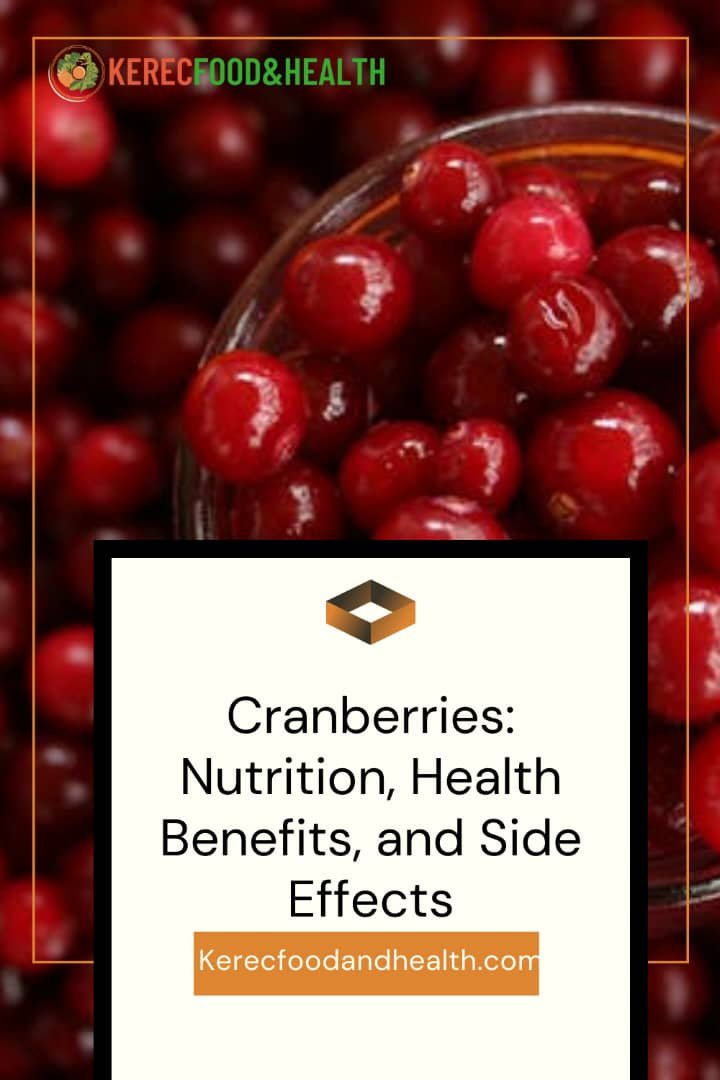Discover the nutrition, health benefits, and potential side effects of cranberries. Learn how these nutrient-rich berries can enhance your well-being while ensuring you enjoy them safely in your diet.
Introduction
Cranberries are more than just a holiday staple; they are a powerhouse of nutrition packed with health benefits. Rich in vitamins, minerals, and antioxidants, these tart berries play a vital role in promoting overall well-being. Additionally, cranberries are known for their potential to prevent urinary tract infections and support heart health, making them a valuable addition to any diet. However, it is essential to understand both the benefits and possible side effects of cranberries to maximize their advantages. In this post, we will explore the nutritional profile of cranberries, delve into their health benefits, and discuss any side effects, you should be aware of. Whether you enjoy them fresh, dried, or in juice form, discovering the full potential of cranberries can enhance your journey toward better health.
Cranberries Nutrition
Cranberries are not only delicious but also packed with a variety of nutrients that contribute to their health benefits.
According to U.S. Department of Agriculture. Food-Data Central, the Nutritional Value of Fresh Cranberries (per 100 grams) contains:
- Calories: 46 kcal
- Water: 87.1 g
- Protein: 0.4 g
- Total Fat: 0.1 g
- Saturated Fat: 0.0 g
- Polyunsaturated Fat: 0.0 g
- Monounsaturated Fat: 0.0 g
- Carbohydrates: 12.2 g
- Sugars: 4.0 g
- Dietary Fiber: 4.6 g
Vitamins
- Vitamin C: 14 mg (about 24% of the Daily Value)
- Vitamin E: 1.2 mg (about 6% of the Daily Value)
- Vitamin K1: 2.2 mcg (about 2% of the Daily Value)
- Various B Vitamins (including B1, B2, B3, B5, B6, B9): trace amounts
Minerals
- Calcium: 8 mg
- Iron: 0.2 mg
- Magnesium: 6 mg
- Phosphorus: 11 mg
- Potassium: 80 mg
- Sodium: 1 mg
- Zinc: 0.1 mg
Antioxidants: Cranberry contain several types of antioxidants, including flavonoids and polyphenols, which contribute to their health benefits.
Incorporating cranberry into your diet can be a delicious way to boost your nutritional intake while enjoying their numerous health benefits.
Health Benefits of Cranberries
Cranberries are not just a delicious addition to your holiday table; they are also packed with health benefits that can enhance your overall well-being. Rich in vitamins, minerals, and antioxidants, these tart berries offer numerous advantages for your health. In this blog post, we will explore the various health benefits of cranberries and discuss how you can easily incorporate them into your daily diet.
1. Rich in Nutrients
First and foremost, cranberries are a nutrient-dense food. A cup of raw cranberries boasts impressive amounts of vitamin C, dietary fiber, and antioxidants. According to a study published in the Journal of Agricultural and Food Chemistry, cranberry contain various phytochemicals that contribute to their health-boosting properties
2. Supports Heart Health
Cranberry support heart health in several ways. They are rich in antioxidants, particularly flavonoids, which help reduce inflammation and improve cholesterol levels. Research indicates that regular consumption of cranberry can lower LDL (bad) cholesterol and increase HDL (good) cholesterol, leading to a healthier heart. Furthermore, cranberries may help lower blood pressure and improve blood vessel function, ultimately reducing the risk of cardiovascular disease. Thus, incorporating cranberries into your meals can be a heart-healthy choice.
3. Boosts Immune Function
Another significant health benefit of cranberry is their immune-boosting properties. Cranberries are an excellent source of vitamin C, which is essential for maintaining a healthy immune system. This vitamin helps protect against infections and supports the body’s healing processes. Regular consumption of vitamin C-rich foods can decrease the duration and severity of colds and other infections. The American Journal of Clinical Nutrition emphasizes that adequate vitamin C intake is vital for immune function. Additionally, the antioxidants found in cranberry help combat oxidative stress, further supporting immune health. Therefore, incorporating cranberry into your diet can provide an added layer of protection against illness.
4. Aids in Digestive Health
Cranberries are also beneficial for digestive health due to their high dietary fiber content. One cup of fresh cranberries provides about 4 grams of fiber, which promotes regular bowel movements and aids in digestion. Furthermore, the fiber in cranberries acts as a prebiotic, nourishing the beneficial bacteria in the gut and contributing to a healthy microbiome.
5. May Help with Weight Management
Incorporating cranberry into your diet can be a smart choice for weight management. These berries are low in calories but high in fiber, which helps you feel full and satisfied. By adding cranberries to meals or snacks, you can curb cravings and reduce the likelihood of overeating. Additionally, the natural sweetness of dried cranberry can serve as a healthier alternative to sugary snacks.
6. Potential Cancer-Fighting Properties
Emerging research suggests that cranberries may have cancer-fighting properties. The antioxidants and phytochemicals in cranberries can inhibit the growth of cancer cells and reduce inflammation, which is linked to the development of cancer. While more research is needed, these findings highlight the potential of cranberries as a complementary food in cancer prevention strategies.
7. Supports Urinary Tract Health
One of the most well-known benefits of cranberry is their ability to promote urinary tract health. Studies have shown that cranberries contain compounds called proanthocyanidins, which help prevent bacteria, such as E. coli, from adhering to the bladder walls. This action significantly reduces the risk of urinary tract infections (UTIs). For individuals prone to UTIs, incorporating cranberries or cranberry juice into their diet can be a proactive measure to support urinary health. A systematic review in the American Journal of Clinical Nutrition confirms this, stating that cranberry products can be effective in reducing UTI recurrence
Conclusion
In summary, cranberries offer a wide array of health benefits that make them a valuable addition to your diet. From supporting urinary tract health to enhancing heart health and boosting the immune system, these nutrient-rich berries can significantly impact your overall well-being. By incorporating cranberry into your meals through fresh, dried, or juiced forms, you can enjoy their delicious flavor while reaping their numerous health rewards.
Side Effects Of Cranberry You Should Be Aware Of!
Cranberries are often touted for their numerous health benefits, from supporting urinary tract health to enhancing heart health. However, like any food, they can also have side effects when consumed in excessive amounts or by certain individuals. Understanding these potential issues is crucial for enjoying cranberries while minimizing risks. In this blog post, we will explore the side effects of cranberries and offer guidance on how to incorporate them into your diet safely.
1. Gastrointestinal Distress
One common side effect of consuming cranberry is gastrointestinal discomfort. Eating large quantities, especially dried cranberry that may contain added sugar, can lead to bloating, gas, or diarrhea. This reaction typically occurs due to the high fiber content in cranberries, which, while beneficial in moderation, can cause digestive issues when consumed excessively. To avoid discomfort, start with small servings and gradually increase your intake as your body adjusts.
2. Allergic Reactions
Although rare, some individuals may experience allergic reactions to cranberry. Symptoms can range from mild itching and hives to more severe reactions such as swelling or difficulty breathing. If you have known allergies to other fruits in the same family, such as blueberries or bilberries, you may also be at risk for a cranberry allergy. If you suspect an allergy, it’s important to consult a healthcare professional for guidance.
3. Interaction with Medications
Cranberries can interact with certain medications, particularly blood thinners like warfarin. These berries contain compounds that may enhance the effects of anticoagulants, leading to an increased risk of bleeding. If you take blood thinners or other medications, consult your doctor before consuming large amounts of cranberries. This precaution ensures you can safely enjoy their benefits without risking your health.
4. Risk of Kidney Stones
Cranberries are high in oxalates, which can contribute to the formation of kidney stones in susceptible individuals. Studies indicate that excessive consumption of oxalate-rich foods, including cranberries, can increase the risk of developing calcium oxalate stones. If you have a history of kidney stones, consider limiting your intake of cranberries and discussing your dietary choices with a healthcare provider.
5. High Sugar Content in Processed Products
Many cranberry products, such as juices and dried cranberries, often contain added sugars that can lead to health issues when consumed in excess. For example, cranberry juice cocktails may contain significantly less actual cranberry juice and more added sugar, which can negate some of the health benefits. To avoid excessive sugar intake, opt for unsweetened cranberry juice or enjoy fresh cranberries without added sugars.
Conclusion
While cranberries are a nutritious addition to your diet, it’s essential to be aware of their potential side effects. By consuming cranberries in moderation and considering your individual health conditions, you can safely enjoy their many health benefits. If you have concerns or pre-existing health issues, consulting with a healthcare professional can help you make informed choices about incorporating cranberries into your meals. Ultimately, enjoying cranberries as part of a balanced diet can contribute to your overall health and well-being.
References
https://www.medicalnewstoday.com/articles/269142
https://www.medicalnewstoday.com/articles/269142
https://www.healthline.com/nutrition/foods/cranberries
https://fdc.nal.usda.gov/fdc-app.html#/food-details/169065/nutrients
https://www.webmd.com/vitamins/ai/ingredientmono-958/cranberry
https://www.drugs.com/mtm/cranberry.html
https://www.drugs.com/mtm/cranberry.html
https://www.webmd.com/food-recipes/health-benefits-cranberries





